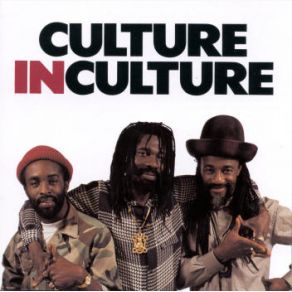Culture in Culture
Download links and information about Culture in Culture by Culture. This album was released in 1986 and it belongs to Reggae, Roots Reggae, World Music genres. It contains 10 tracks with total duration of 36:35 minutes.

|
|
|---|---|
| Artist: | Culture |
| Release date: | 1986 |
| Genre: | Reggae, Roots Reggae, World Music |
| Tracks: | 10 |
| Duration: | 36:35 |
| Buy it NOW at: | |
| Buy on iTunes $9.90 | |
| Buy on iTunes $9.90 | |
| Buy on Amazon $9.49 | |
Tracks
[Edit]| No. | Title | Length |
|---|---|---|
| 1. | Peace and Love | 4:14 |
| 2. | Capture Rasta | 3:40 |
| 3. | Old Tattoo | 3:10 |
| 4. | This Way | 3:53 |
| 5. | Step Along | 2:51 |
| 6. | Five to One Strip Me | 3:52 |
| 7. | Praise Him | 3:57 |
| 8. | Mr. Music | 4:12 |
| 9. | Soon Come | 3:23 |
| 10. | Pure War | 3:23 |
Details
[Edit]Usually a five-year hiatus spells the death of a band's career but, in Culture's case, it was if the group was merely gathering strength for the long haul. After splitting up in 1981, the trio reformed in 1986 and recorded Culture in Culture. Once again Joseph Hill would take on the production mantle, but this time he was aided by Enos McLeod and Alvin Ranglin, which saved this album from the flaws of Hill's previous effort, Lion Rock. Culture in Culture has a relaxed quality to the sound that perfectly fits the trio's own more easygoing air. In the intervening years, Hill seems to have mellowed, the emotive excesses of the past have faded, and, while his delivery remains powerful, it's now much more in keeping with the actual songs. With the return of Albert "Ralph" Walker and Kenneth Dayes, his vocals are better balanced; the pair's sonorous harmonies offset Hill, who himself returns to occasional singing. The songs themselves are equally strong, with the production and arrangements emphasizing the melodies, and the album contains a clutch of interesting elements and musical blends. One of the highlights, "Peace and Love," grafts a dancehall feel to a dubby reggae track, a hybrid especially created for a song promoting unity and peace in the dancehalls, the tinkling piano melody that shimmers in and out adding a further intriguing quality. "Capture Rasta" is even more dancehall-based, and here Hill's vocals bleed into a pure toast, leaving one to wonder why the singer didn't pursue a genre seemingly tailor-made for his delivery. Elsewhere, the trio engages in choral singing, delves into some stunning rocksteady, and fills the grooves with the pure, close harmonies of dread roots. The lyrical themes are equally diverse, from the dangers of gambling to the glory of performing, as well as diving back into history and other cultural themes, and praising Jah, of course. One of the strongest comeback albums around, a decade after the trio's formation Culture returned with a winner. It may not have been as groundbreaking as Two Sevens Clash, but it's a wonderful record nonetheless.